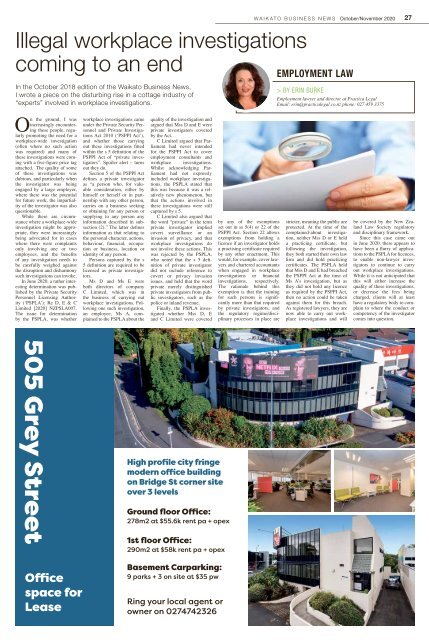Waikato Business News October/November 2020
Waikato Business News has for a quarter of a century been the voice of the region’s business community, a business community with a very real commitment to innovation and an ethos of co-operation.
Waikato Business News has for a quarter of a century been the voice of the region’s business community, a business community with a very real commitment to innovation and an ethos of co-operation.
You also want an ePaper? Increase the reach of your titles
YUMPU automatically turns print PDFs into web optimized ePapers that Google loves.
WAIKATO BUSINESS NEWS <strong>October</strong>/<strong>November</strong> <strong>2020</strong><br />
27<br />
Illegal workplace investigations<br />
coming to an end<br />
In the <strong>October</strong> 2018 edition of the <strong>Waikato</strong> <strong>Business</strong> <strong>News</strong>,<br />
I wrote a piece on the disturbing rise in a cottage industry of<br />
“experts” involved in workplace investigations.<br />
EMPLOYMENT LAW<br />
> BY ERIN BURKE<br />
Employment lawyer and director at Practica Legal<br />
Email: erin@practicalegal.co.nz phone: 027 459 3375<br />
On the ground, I was<br />
increasingly encountering<br />
these people, regularly<br />
promoting the need for a<br />
workplace-wide investigation<br />
(often where no such action<br />
was required) and many of<br />
these investigations were coming<br />
with a five-figure price tag<br />
attached. The quality of some<br />
of these investigations was<br />
dubious, and particularly when<br />
the investigator was being<br />
engaged by a large employer,<br />
where there was the potential<br />
for future work, the impartiality<br />
of the investigator was also<br />
questionable.<br />
While there are circumstance<br />
where a workplace-wide<br />
investigation might be appropriate,<br />
they were increasingly<br />
being advocated for in cases<br />
where there were complaints<br />
only involving one or two<br />
employees, and the benefits<br />
of any investigation needs to<br />
be carefully weighed against<br />
the disruption and disharmony<br />
such investigations can invoke.<br />
In June <strong>2020</strong>, a rather interesting<br />
determination was published<br />
by the Private Security<br />
Personnel Licensing Authority<br />
(‘PSPLA’): Re D, E & C<br />
Limited [<strong>2020</strong>] NZPSLA007.<br />
The issue for determination<br />
by the PSPLA, was whether<br />
workplace investigations came<br />
under the Private Security Personnel<br />
and Private Investigations<br />
Act 2010 (‘PSPPI Act’),<br />
and whether those carrying<br />
out these investigations fitted<br />
within the s 5 definition of the<br />
PSPPI Act of “private investigators”.<br />
Spoiler alert – turns<br />
out they do.<br />
Section 5 of the PSPPI Act<br />
defines a private investigator<br />
as “a person who, for valuable<br />
consideration, either by<br />
himself or herself or in partnership<br />
with any other person,<br />
carries on a business seeking<br />
or obtaining for any person or<br />
supplying to any person any<br />
information described in subsection<br />
(2).” The latter defines<br />
information as that relating to<br />
the personal character, actions,<br />
behaviour, financial, occupation<br />
or business, location or<br />
identity of any person.<br />
Persons captured by the s<br />
5 definition are required to be<br />
licensed as private investigators.<br />
Ms D and Ms E were<br />
both directors of company<br />
C Limited, which was in<br />
the business of carrying out<br />
workplace investigations. Following<br />
one such investigation,<br />
an employee, Ms A, complained<br />
to the PSPLA about the<br />
quality of the investigation and<br />
argued that Mss D and E were<br />
private investigators covered<br />
by the Act.<br />
C Limited argued that Parliament<br />
had never intended<br />
for the PSPPI Act to cover<br />
employment consultants and<br />
workplace investigations.<br />
Whilst acknowledging Parliament<br />
had not expressly<br />
included workplace investigations,<br />
the PSPLA stated that<br />
this was because it was a relatively<br />
new phenomenon, but<br />
that the actions involved in<br />
these investigations were still<br />
captured by s 5.<br />
C Limited also argued that<br />
the word “private” in the term<br />
private investigator implied<br />
covert surveillance or an<br />
invasion of privacy, and that<br />
workplace investigations do<br />
not involve these actions. This<br />
was rejected by the PSPLA,<br />
who noted that the s 5 definition<br />
of private investigator<br />
did not include reference to<br />
covert or privacy invasion<br />
issues, and held that the word<br />
private merely distinguished<br />
private investigators from public<br />
investigators, such as the<br />
police or inland revenue.<br />
Finally, the PSPLA investigated<br />
whether Mss D, E<br />
and C Limited were covered<br />
by any of the exemptions<br />
set out in ss 5(4) or 22 of the<br />
PSPPI Act. Section 22 allows<br />
exemptions from holding a<br />
licence if an investigator holds<br />
a practising certificate required<br />
by any other enactment. This<br />
would, for example, cover lawyers<br />
and chartered accountants<br />
when engaged in workplace<br />
investigations or financial<br />
investigations, respectively.<br />
The rationale behind this<br />
exemption is that the training<br />
for such persons is significantly<br />
more than that required<br />
by private investigators, and<br />
the regulatory regime/disciplinary<br />
processes in place are<br />
stricter, meaning the public are<br />
protected. At the time of the<br />
complained-about investigation,<br />
neither Mss D or E held<br />
a practicing certificate, but<br />
following the investigation,<br />
they both started their own law<br />
firm and did hold practicing<br />
certificates. The PSPLA held<br />
that Mss D and E had breached<br />
the PSPPI Act at the time of<br />
Ms A’s investigation, but as<br />
they did not hold any licence<br />
as required by the PSPPI Act,<br />
then no action could be taken<br />
against them for this breach.<br />
As registered lawyers, they are<br />
now able to carry out workplace<br />
investigations and will<br />
be covered by the New Zealand<br />
Law Society regulatory<br />
and disciplinary framework.<br />
Since this case came out<br />
in June <strong>2020</strong>, there appears to<br />
have been a flurry of applications<br />
to the PSPLA for licences,<br />
to enable non-lawyer investigators<br />
to continue to carry<br />
out workplace investigations.<br />
While it is not anticipated that<br />
this will either increase the<br />
quality of these investigations,<br />
or decrease the fees being<br />
charged, clients will at least<br />
have a regulatory body to complain<br />
to where the conduct or<br />
competency of the investigator<br />
comes into question.<br />
505 Grey Street<br />
Office<br />
space for<br />
Lease<br />
High profile city fringe<br />
modern office building<br />
on Bridge St corner site<br />
over 3 levels<br />
Ground floor Office:<br />
278m2 at $55.6k rent pa + opex<br />
1st floor Office:<br />
290m2 at $58k rent pa + opex<br />
Basement Carparking:<br />
9 parks + 3 on site at $35 pw<br />
Ring your local agent or<br />
owner on 0274742326


















